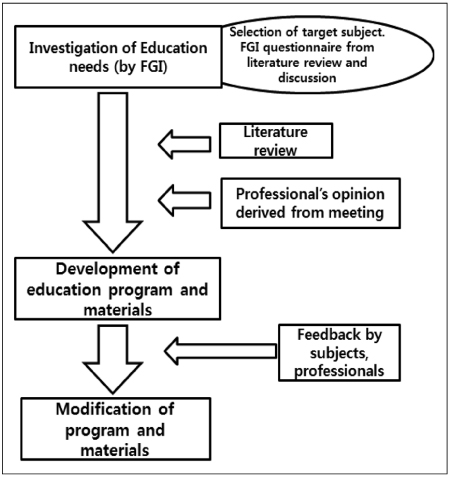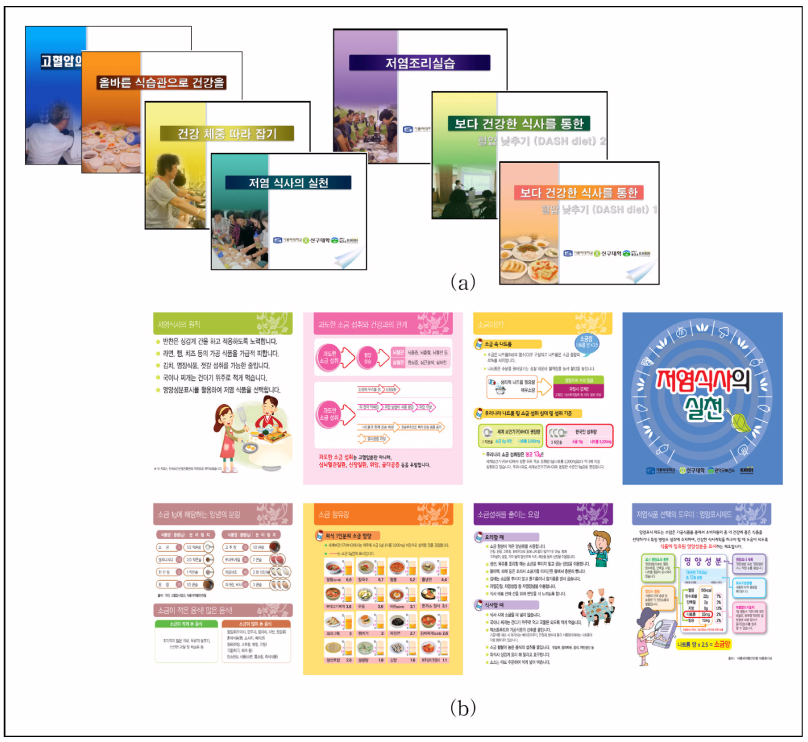Korean J Community Nutr.
2012 Oct;17(5):623-636. 10.5720/kjcn.2012.17.5.623.
Development of Nutrition Education Program for Hypertension Based on Health Belief Model, Applying Focus Group Interview
- Affiliations
-
- 1Department of Food Science & Nutrition, The Catholic University of Korea, Bucheon, Korea. hkyeong@catholic.ac.kr
- 2Department of Food & Nutrition, Shingu College, Songnam, Korea.
- 3Nutrition Policy & Promotion Team, Korea Health Industry Development Institute, Chungbuk, Korea.
- KMID: 2267449
- DOI: http://doi.org/10.5720/kjcn.2012.17.5.623
Abstract
- Health Belief Model is a socio-psychological theory of decision making to individual health-related behaviors. This study was aimed to develop an effective education program for hypertension based on health belief model. The main factors of health belief model were investigated by focus group interview (FGI) with 23 hypertensive or prehypertensive subjects aged over fifty years. 'Perceived susceptibility' to hypertension was family history, neglect of health care, preference for salty food, broth of soup and stew. Lifelong medication, complications, and medical costs were reported as 'perceived severity' of hypertension. 'Perceived benefits' of hypertension management were decrease of medicinal dose, reduction of medical costs, and healthy eating habits of the family, while 'perceived barriers' were lack of palatability of low salt diet, convenience-oriented dietary habits, and limited choice of foods when eating out. Subjects mentioned TV health programs, public health center programs, and advice from doctors and family as 'cues to action' of hypertension management. These qualitative information provided basis for developing a nutrition education program for hypertension which could be implemented in the public health center. Eight week program was composed of understanding hypertension, risk factor management (eating habits, weight), low salt diet (principles, cooking), advanced management for healthy diet in 2 sessions, and summary. Each session was designed to alert the susceptibility and severity, to emphasize the benefits, and to reduce the barriers by providing dietary monitoring, practical advice, and action tips.
MeSH Terms
Figure
Cited by 1 articles
-
Effect of a public health center-based nutrition education program for hypertension in women older than 50 years of age
Seoyun Park, Jong-Sook Kwon, Hye-Kyeong Kim
J Nutr Health. 2018;51(3):228-241. doi: 10.4163/jnh.2018.51.3.228.
Reference
-
1. Abood DA, Black DR, Diane F. Nutrition education worksite intervention for university staff: application of the health belief model. J Nutr Educ Behav. 2003. 35(5):260–267.2. American Heart Association. Blood pressure risk calculator. 2012. cited 2012 May 1. Available from http://www.heart.org.3. Catholic University of Korea & Management Center for Health promotion. Integrated health promotion service in community health center. 2010. cited 2011 March 1. Available from http://research.hp.go.kr.4. Choi-Kwon S, Kim JS. Lifestyle factors and risk of stroke in Seoul, South Korea. J Stroke Cerebrovasc Dis. 1998. 7(6):414–420.5. Cho SN, Lee HJ, Joo YJ, Kim NY. Qualitative research design & practice. 2011. Seoul: Green;95–116.6. Ellis J, Johnson MA, Fischer JF, Hargrove JL. Nutrition and health education intervention for whole grain foods in the georgia older Americans nutrition program. J Nutr Elder. 2005. 24(3):67–83.7. Glanz K, Rimer BK, Viswanath K. Health behavior and health education: theory, research and practice. 2008. SF: Joseey-Bass;45–62.8. Health Insurance Policy Institute. Analysis of health insurance increasing factor. 2010. cited 2011 March 1. Available from http://www.nhic.or.kr/.9. He FJ, Macgregor GA. Reducing population salt intake worldwide: from evidence to implementation. Prog Cardiovasc Dis. 2010. 52(5):363–382.10. Huh GY. Analysis of the risk factors related to hypertension and development of FFQ and nutrition education program. 2003. The Catholic University of Korea;120–148. Dissertation.11. Inui TS, Yourtee EL, Williamson JW. Improved outcomes inhypertension after physician tutorials. Ann Intern Med. 1976. 84(6):646–651.12. Jo HS, Kim CB, Lee HW, Jeong HJ. A meta-analysis of health related behavior study based on health belief model in Korean. Korean J Health Psychol. 2004. 9(1):69–84.13. Jung EJ. The effect of salt reduction education program combined with DASH on blood pressure and salt intake of adults. 2008. Catholic University of Korea;9–20. MS thesis.14. Korea Food & Drug Administration. Reduce sugar, natrium and fat intakes. 2012. cited 2011 May 1. Available from http://www.foodnara.go.kr.15. Kim MK, Han JI, Chung YJ. Dietary behavior related to salty food intake of adults living in a rural area according to saline sensitivity. Korean J Nutr. 2011. 44(6):537–550.16. Lee KJ, Park SH, Park KO. Health counseling. 2008. Seoul: Ewha Womans University Press;115–122.17. Ministry of Health & Welfare, Korea Centers for Disease Control & Prevention. Korea National Health & Nutrition Examination Survey. 2011. cited 2011 March 1. Available from http://knhanes.cdc.go.kr.18. Moon EH, Kim KY. Evaluation of nutrition education for hypertension patients age 50 years and over. Korean J Community Nutr. 2011. 16(1):62–74.19. National Hypertension Center. Hypertension. 2012. cited 2012 May 1. Available from http://www.hypertension.or.kr.20. Nelson EC, Stason WB, Neutra RR, Solomon HS, Mcardle PJ. Impact of patient perceptions on compliance with treatment for hypertension. Med Care. 1978. 16(11):893–906.21. Park YS, Son SM, Lim WJ, Kim SB, Chung YS. Comparison of dietary behaviors related to sodium intake by gender and age. Korean J Community Nutr. 2008. 13(1):1–12.22. Rosenstock IM. Historical origins of the health belief model. Health Educ Monogr. 1974. 2:328–335.23. Salt Reduction Center. Salt down, health up. 2012. cited 2011 March 1. Available from http://www.saltdown.com.24. Silverman D. Doing qualitative research. 2010. third edition. London: SAGE;131–132. 192–199.25. Son SM, Huh GY. Dietary risk factor, hypertension, urinary sodium. Korean J Community Nutr. 2006. 11(5):661–672.26. Statistics Korea. Annual report on the cause of death statistics. 2010. cited 2011 March 1. Available from http://kostat.go.kr.27. Sullivan KA, White KM, Young RM, Chang A, Roos C, Scott C. Predictors of intention to reduce stroke risk among people at risk of stroke: an application of an extended health belief model. Rehabil Psychol. 2008. 53(4):505–512.28. The Canadian Hypertension Education Program. Hypertension Canada. 2012. cited 2011 March 1. Available from http://www.hypertension.ca.29. Yim KS, Min YH, Lee TY. Evaluations of the Elderly Nutrition Improvement Program in the community health center: Effects of nutrition counseling and education program on elderly dietary behavior. J Korean Diet Assoc. 1997. 3(2):197–210.30. Yim KS. The Effects of a nutrition education program for hypertensive female elderly at the public health center. Korean J Community Nutr. 2008. 13(5):640–652.31. Yoon HS, Lee H, Lee S. Factors associated with the use of health promotion program -Seoul community health center-. Health Soc Welf Rev. 2008. 28(2):157–184.32. Glanz K, Rimer BK, Lewis FM. T Yoo HR Yoo . Behavior and health education: Theory, research, and practice. 2009. 3rd edition. Seoul: Koonja;43–69.
- Full Text Links
- Actions
-
Cited
- CITED
-
- Close
- Share
- Similar articles
-
- Development of Nutrition Education Program for Vietnamese Female Marriage Immigrants in Korea Based on the Health Belief Model
- Development of Nutrition Education Program for Consumers to Reduce Sodium Intake Applying the Social Cognitive Theory: Based on Focus Group Interviews
- The Development of a Nutrition Education Program for Low-income Family Children by applying the Social Cognitive Theory and Health Belief Model
- The Development Study of a Medical Ethics Education Program by Using Simple ISD Model
- Development of Food Safety and Nutrition Education Contents for the Elderly: by Focus Group Interview and Delphi Technique



